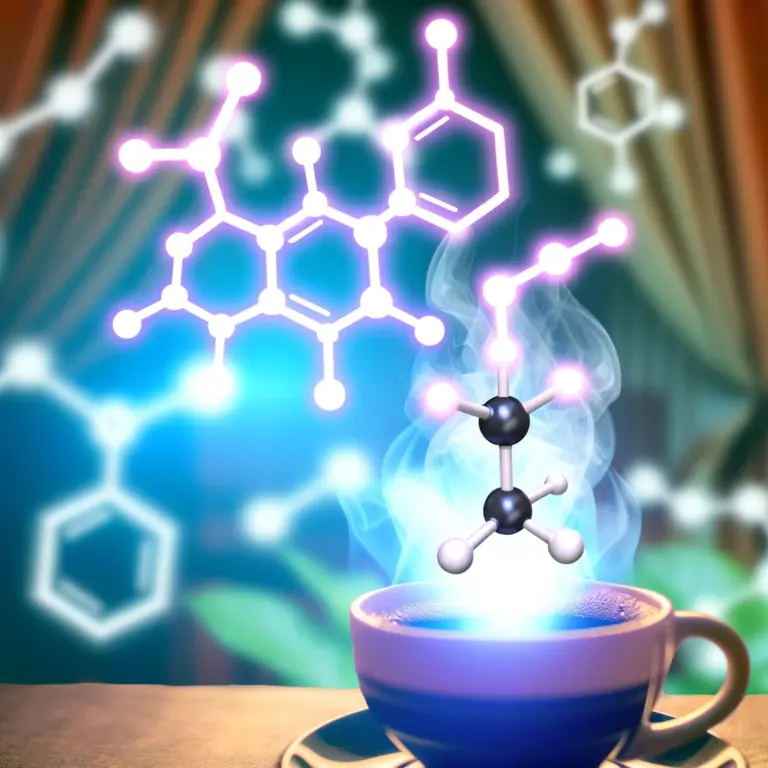From Bean To Brain: How Trigonelline Could Revolutionize Alzheimer’s Treatment
Picture this: a common kitchen staple, hidden in plain sight, just might hold the secret to tackling one of today’s most daunting health challenges. I’m talking about coffee beans – yes, those magical little nuggets that kick-start our mornings might be superheroes in disguise.
With my years spent deep in the trenches of neuroscientific research, pouring over the mysteries of the brain and how it ticks, I’ve seen firsthand how nature can sometimes offer up surprising solutions.
Now let me spill the beans on something particularly exciting – there’s this compound called trigonelline found abundantly in coffee, and it’s catching eyes for its potential against Alzheimer’s disease, a condition that has eluded cure for too long.
This alkaloid isn’t just another drop in the bucket; studies suggest it could seriously shake things up by protecting our noggin’ from memory loss and cognitive decline. Intrigued? You should be because what follows is a full run-down on why your morning brew might just be your brain’s best friend.
Ready to dive into some caffeinated science? Let’s go!
Understanding Alzheimer’s Disease
Ah, Alzheimer’s Disease – that pesky thief of memories and architect of confusion in the brain. It sneaks up like a silent intruder, disrupting lives with its cocktail of oxidative stress and those notorious AGEs (nope, not the kind from birthday candles).
Now, don’t get me started on the cognitive impairment; let’s just say it turns your mental playlist into a jumbled mixtape – not cool. But hey, stick around because we’re about to dive deeper into this maze..
where every twist and turn might just lead us to some hopeful news.
Oxidative stress
Oxidative stress is like a rust that happens inside your brain. It’s when bad molecules, called free radicals, start causing trouble for your brain cells. Think of it as if these tiny bullies are running around and damaging everything they touch.
Your body tries to stop them with antioxidants, which are like the superheroes protecting your brain.
Now imagine coffee beans holding a secret weapon against this damage. They have something special in them called trigonelline. Research says it could help fight those nasty free radicals! So having coffee might not just wake you up; it could be keeping your brain safe too.
How cool is that?.
Advanced glycation end products (AGEs)
In our brains, sticky substances called AGEs build up over time. They’re like unwanted gum on a shoe. These AGEs are not good for us at all; they mess with how our brain cells work and can lead to memory problems.
It’s kind of like when too much junk collects in your room and you can’t find your favorite toy anymore.
But here comes trigonelline, strutting in from coffee beans like a superhero! This nifty compound has the power to fight those pesky AGEs. Think of it as a cleaning crew that sweeps away the stickiness so brain cells can do their happy dance again.
With less gunk messing up the works, memories might just come back clearer for people who have Alzheimer’s. So now that we’ve dug into these troublemakers called AGEs, let’s look at what else trigonelline has up its sleeve—like some secret moves only it knows!
Cognitive impairment
Cognitive impairment means trouble with thinking, remembering, or making decisions. Alzheimer’s disease can cause this kind of problem in the brain. Folks with Alzheimer’s might forget names, get lost in places they know, or have a hard time paying bills on their own.
Now imagine if there was something that could help! Trigonelline is buzzing with potential to protect brains and boost memory function. You find this neat stuff in coffee beans and it could be a game-changer for people fighting Alzheimer’s.
It does more than just wake you up – it may also keep your memories safe and sound.
Next up: let’s dive into how trigonelline works its magic against Alzheimer’s..
Potential Benefits of Trigonelline for Alzheimer’s Treatment
Diving into the world of Alzheimer’s treatment, it turns out that a humble coffee bean compound called trigonelline might just be our next big superstar. Who knew that your morning cup of joe could hold the secret to shielding our brains from those pesky memory thieves?.
Anti-glycation effects
Trigonelline jumps into action against those nasty AGEs – you know, the advanced glycation end products that mess with the brain in Alzheimer’s. It’s like a superhero fighting off villains to protect our noggin.
These AGEs are bad news because they make proteins stick together when they shouldn’t, which can lead to all sorts of problems with thinking and remembering stuff.
Lucky for us, sipping on coffee loaded with trigonelline might just be a shield against this trouble. Studies show that this bean buddy could prevent those proteins from clumping up in the first place.
So basically, more coffee could mean less protein gunk in our brains and a happier life for our neurons!
Neuroprotective activity
So, we’ve seen how trigonelline fights off harmful sugars in the brain, but it does even more. It acts like a superhero for nerve cells! Picture this compound as a tiny shield, guarding your brain’s delicate cells from damage and keeping them alive and well.
This is huge because when our nerve cells are safe, our memories stay sharp.
These neuroprotective powers of trigonelline are so cool because they help stop bad proteins from clumping together in the brain – you know, those pesky ones that mess with memory in Alzheimer’s disease.
By blocking these proteins, trigonelline helps keep the connections between nerve cells strong. Imagine it’s like preventing traffic jams on highways inside your brain; everything flows smoothly, and messages get where they need to go without any trouble.
Now that’s some serious brain protection worth talking about!
Repair of spatial learning and memory
Trigonelline isn’t just a fancy word; it’s like a secret agent in coffee beans that might help our brains remember where we left the car keys! Imagine this: You’re playing a game where you have to find your way out of a maze, but it feels super tough.
Now, think about how trigonelline could be like getting a map that helps your brain learn the twists and turns faster. That’s what scientists are seeing happen in mice with Alzheimer’s disease when they give them trigonelline.
This amazing stuff has shown some serious promise for fixing memory problems tied to Alzheimer’s. It’s like giving your brain’s GPS an upgrade. Picture little workers inside your head clearing up the fog so you can figure out which way is north again.
Next up, let’s dive into how trigonelline works its magic on the cells in our noggin!
Mechanisms of Action for Trigonelline
So, you’ve got a hankering to know how this compound found in your morning cup of joe might just be the superhero your neurons never knew they needed, right? Well buckle up, because we’re about to dive into the nitty-gritty of trigonelline’s inner workings—no capes required but plenty of brainy action guaranteed.
Keep reading and let’s spill the beans together on this potential game-changer for our grey matter!
Antioxidant properties
Trigonelline is like a superhero for your brain cells. It fights off the bad guys called free radicals. Free radicals are mean little molecules that can hurt our brain cells. But don’t worry, trigonelline has antioxidant powers that can protect the brain from these harmful molecules.
Imagine your brain as a busy city and trigonelline as its best defender. The antioxidants in trigonelline keep the streets safe and clean by stopping damage from oxidative stress. This means it helps keep your memory sharp and your thoughts clear!
Reduction of AGEs
AGEs are like the junk in your brain that can make it sick, and nobody likes a messy room, right? Well, think of trigonelline as the tidy-up crew. This smart little helper from coffee beans might just sweep away those harmful AGEs.
It’s kind of like giving your brain a fresh start! Just imagine—every cup of coffee you sip not only warms you up but could also be kicking those nasty AGEs to the curb.
Now, get this: studies show trigonelline gets into the brain and starts cleaning house. It breaks down those sticky proteins that clump together and cause trouble. Keeping your neurons happy is super important because they’re what help you remember stuff and learn new things.
So drinking coffee doesn’t just wake you up; it could be keeping your thinker sharp too!
Regulation of synaptic proteins
Trigonelline does some pretty cool things for brains. It helps keep the proteins at synapses, which are like tiny bridges for nerve signals, working right. Think of it as a tune-up for your brain’s communication network! Synaptic proteins need to stay in shape so messages can zip through your brain, helping you remember where you put your keys or how to solve that tricky math problem.
Now here’s the kicker: without enough trigonelline, these proteins might get lazy and start clumping together. That’s bad news because it can lead to memory loss and other problems in your thinker-box (that’s a fun way to say ‘brain’).
But when trigonelline steps in, it tells those proteins to shape up and breaks up any clumps trying to form – sort of like a bouncer at a wild brain protein party. The end game? Better learning and sharper memory skills.
And who wouldn’t want that?.
Inhibition of cell apoptosis and fibrosis
Cell apoptosis is like a programmed cell death, and fibrosis can happen when too much scar tissue forms in the brain. Guess what? Trigonelline might just have our backs here! This cool bean component works hard to stop cells from dying when they shouldn’t and keeps scar tissue from going wild.
That’s pretty important for keeping brains healthy, especially for folks dealing with Alzheimer’s disease.
Now let’s chat about how trigonelline doesn’t play favorites; it helps protect all kinds of neurons. And you know what neurons are? Those tiny messengers in your brain that need to stay fit so your memory stays sharp.
So by blocking bad stuff like apoptosis and fibrosis, trigonelline might be throwing a lifeline to those precious brain cells. Moving on, there’s also some chatter about how this could lead to better days for people struggling with memory troubles..
Clinical Relevance of Trigonelline
Ah, now we’re getting to the juicy part – the clinical relevance of trigonelline. You see, what’s truly fascinating here is not just that trigonelline might be a brain-saving superstar (fingers crossed!), but how these early findings from animal studies are starting to paint a pretty promising picture for us humans too.
We’re talking about potential memory makeover magic, with this compound sneaking into the brain after hitching a ride through your morning cup-o-joe and then setting up shop to protect those precious neurons! So grab another coffee (for..
science?) and let’s dive deeper into why trigonelline could potentially offer more than just a caffeine kick. 🧠☕.
Animal studies
Scientists have been busy testing trigonelline on animals, especially mice that model Alzheimer’s disease. They found some pretty amazing things! For instance, these mice got their memory back after getting trigonelline.
This shows us it could be a game-changer for people with Alzheimer’s. Think about it – something as simple as an ingredient from coffee beans might help brains work better.
In labs, they saw that when they gave this stuff to the mice, their nerve cells started growing like crazy. This is super important because in our brains, nerve cells need to talk to each other all the time.
If we can get them chatting more and healthier with trigonelline, that’s big news for tackling brain diseases! It feels like every day we learn more about how cool nature can be in helping humans stay sharp and healthy.
Absorption and brain penetration
Trigonelline is pretty amazing, it can sneak into the brain. This is huge because if something wants to fight Alzheimer’s, it needs to get past the body’s defense system called the blood-brain barrier.
That’s like a super-tight security guard for your brain. Well, trigonelline has what it takes to pass through and get to work inside.
Once there, it goes straight for those nasty bits that cause trouble in Alzheimer’s disease. Think of trigonelline as a tiny superhero diving deep into your mind to keep it safe and sound.
It’s ready to take on those problems messing with memory and thinking skills!
Memory improvement
So, once trigonelline makes its way into the brain, what happens next is pretty exciting. It seems to give memory a real boost. Picture little workers inside your head fixing up all those broken-down memory links! Studies with mice show us that this compound can turn a forgetful brain into one that remembers better.
Imagine being able to find where you left your keys without turning the house upside down!
Now think about folks dealing with Alzheimer’s; their memories are like puzzles with missing pieces. Trigonelline steps in and acts like the puzzle master, finding those lost pieces and putting them back where they belong.
Research has found that it may help improve how brains store new information and recall old stuff too—like bringing an old photo album back to life so you can relive those special moments again and again.
Conclusion
Alright, imagine this: a world where your morning cup of coffee does more than just wake you up. That’s the hope with trigonelline – it might just pack a punch against Alzheimer’s.
Picture those tiny beans battling brain troubles and giving memories a fighting chance. It’s early days, but hey, isn’t it cool to think that your brew could be a brain hero? Keep an eye on this space; the bean-to-brain journey is just getting started!






